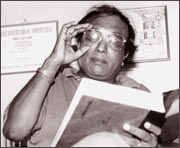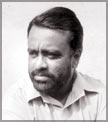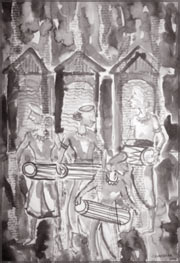|
dailynews |
|
|
|
|
|
OTHER LINKS |

|

|

|
|
Cinema still holds appeal: Tissa AbeysekaraPERSONALITY: Veteran director, script and screenplay writer, actor, film critic and creative writer Tissa Abeysekara is optimistic that the ailing local film industry could be brought back to life by innovative thinking and appropriate strategies. He said that although the audience does not patronise cinema halls as in the old days the allure of the cinema still lingers with them.
"The film audience is growing in the world and so it is in Sri Lanka. Perhaps they do not go to the Cinema halls as in the past. But they still view films through CDs and DVDs and television more than in the past," Abeysekera, Director of the Sri Lanka Television Training Institute said. He says that in the present day there are many ways where people can enjoy a film outside the cinema halls. In this regard authorities should devise ways to provide more opportunities for public to view quality films through whatever means. Abeysekara expressed delight that the Sri Lankan film industry has unearthed a new generation with innovation. Talented and daring filmmakers like Prasanna Vitanage, Ashoka Handagama, Sudath Mahadiulwewa, Inoka Sathyangani, Sathyajith Maitipe and Vimukthi Jayasundara, are a few examples. Vimukthi Jayasundara had the unique privilege to have undergone training in France. "I think they would do even better than the previous generation", said Abeysekara who was among the first crop of directors who experimented with serious cinematic themes. He said, "it is fortunate that they are exposed to international film trends and technologies which we did not have in our time." Abeysekara said. At present there are bountiful opportunities for the new generation to watch international films from CDs and DVDs. Many International film festivals are organised and films are screened. Unlike today in the past they had no other way except the theatre to watch a film. Abeysekara said they hardly had an opportunity to view masterpieces screened in a theatre and had to be content with only Hollywood films. But today there are Swedish, French, Japanese, European and Iranian film festivals. Therefore the younger generation has ample opportunities to learn the latest trends in film making. He recalls how he watched the film "Rashomon" directed by Akira Kurosawa and some other films at the New Olympia theatre. But never a regular screening of such standard films took place. Talking about the controversy surrounding Asoka Handagama's new film "Aksharaya" he said that Handagama was one of the most skilled and innovative film directors of the new generation of film makers."Our protests are based on freedom of expression and not merely to defend Handagama". Talking about his latest film that is to be directed soon Tissa Abeysekara said that the script of the film is ready. It is a film that revolves round a child but it is not a film for children. The child is used as a metaphor to bring out the dishonesty and the hypocrisy of adults. Tissa Abeysekara would commence work on his film in August. They have to wait until the financial end is resolved. Yet the cast of the film is not finalised but Chitra Balasuriya who produced 'Parasathumal' directed by Gamini Fonseka and 'Thunmanhandiya' directed by Mahagamasekara, will produce the new film of Tissa Abeysekara. "Chithra Balasuriya was out of the industry for quite a long time but he was in touch with me", Abeysekara said. "He has been a close friend of mine for a long time. He was the person who suggested that I should work in a film. That is how we started together to work in this film." Earlier there was a production rate of 70-80 films annually. But later it was reduced to 17 films. Asked what steps he thinks should be taken to revive Sri Lanka's film industry, he said, "Actually it boomed at the rate of nearly 125 films a year. But it was at a time that the Sri Lankan Cinema was protected by the state. Practically there is no market in Sri Lanka for such a film production capacity. Then a film will have to remain in the queue for four to five years to be screened." He said then the film stars get their payments and the producers and directors have to wait long to benefit from the films while paying their interests to the banks. He said that all measures that were taken later were wrong approaches to uplift the Sri Lankan film industry. Thereafter film production drastically came down and it was opened to the market forces of supply and demand. Now there should be a well planned strategy to face the challenge. An environment should be created with better infrastructure facilities for films in the country in order to face the challenge. "The co-production is also one such practical solutions since it reduces the production cost while it doubles the harvest". Even in Europe the films are produced in collaboration with a few countries. Sri Lanka can collaborate with India and it will be very beneficial since that they are equipped with modern technology including modern sound recording systems and sound laboratories. "Especially we can collaborate with the Kerala Cinema since we have a close cultural affinity with them. Kerala and Sri Lanka have sharable experiences. They also have aesthetically developed sophisticated film industry which is enriched by veteran film directors like Adoor Gopalakrishnan and Shaji N. Karun. In turn we can enrich our cinema as well. Talking of the language barrier, Abeysekera said, "We have such practical problems but we can overcome them. Our actors would talk in Sinhala while the Kerala actors talk in Malayalam during the shooting. This will be dubbed in both languages. Hence we cultivate the audience from both the countries while we reduce the cost by half. "I had these suggestion when I was the Chairman of the Film Corporation but it was not taken up after I quit in 2001." Abeysekara proved his unique capabilities as a film director through his films 'Karumakkarayo' based on Gunadasa Amarasekara's controversial novel. This was followed by Mahagedara and highly acclaimed 'Viragaya' based on Martin Wickramasinghe's novel. But his film fans did not have the opportunity to enjoy his fourth film "Mang Mula Wel" which was shot but was not completed. It had to stop before it was dubbed due to various reasons including the untimely demise of film star Vijaya Kumaratunga. Later on Damma Jagoda and also the producer died. "Now there is no possibility of completing the film. Only very few including Swarna Mallawaarachchi, Daya Alwis, Cameraman and myself are alive," Tissa Abeysekara said. "But Vijaya Kumaratunga excelled in his role while Swarna Mallawarachchi's acting was remarkable. It was a film revolving round two men and a woman lost in a forest. Gradually this degenerated into a primitive life." As the Director of the Sri Lanka Television Training Institute, he has many plans to implement. "We need to start a complete academy for television productions and film making. We now merely conduct training for television productions. The training should be on the aesthetic and creative aspect in acting, music, editing and directing. What is most lacking is in the field of script writing since we do not have any academy for such training. but at times Wasantha Obeysekara conducts some courses individually and I too had conducted ad-hoc training in script writing. The new generation can achieve lofty standards if they have a film academy for training. A bilingual Tissa began his artistic career in the late fifties as a short story writer publishing his first collection of Sinhala short stories, "Ipanella", when he was still a teenage schoolboy. However a meeting with Dr. Lester James Peries in the early sixties attracted him to the cinema industry. Tissa proved his capability as an accomplished screenplay writer, before he was thirty and among the scripts he wrote are those for 'Nidhanaya' and 'Welikatara'. Tissa has won many national awards in films, for scriptwriting, directing and acting, and an equal number for his work for television. In 1996, Tissa Abeysekara received a feather in his cap by winning the prestigious Gratiaen Prize for the best piece of Creative Writing in English for that year by a resident Sri Lankan for the novel 'Bringing Tony Home'. Tissa Abeysekara has represented his country at seminars and film festivals, and was a jury member at the International Film Festival of Kerala, 2002. He was honoured with the title of Deshabandu, at the National Honours held last year by the then President Chandrika Bandaranaike Kumaratunga. Traditional Art served by a subversive techniqueART: When you speak to the artist Chandana Ranaweera and listen to him, it is obvious that he has a lot to express through the language he feels most comfortable in-his paintings.
All his energy is spent in accurately perceiving the world around him and in conveying this perception to others: the world of contemplation and thought "Samadhichintana" - through the soft colours of his creations, which are directly inspired by temple rituals, wall paintings and Buddhist shrines.
"I get my ideas for paintings specially on Poya days after visiting the temple", he explains. "I want to give a message of what is good, and to make people aware of the mistakes they are making." Each of his paintings is full of scope for meditation and for a journey towards peace and harmony. What appears so original and fascinating is the use of the quite subversive technique of collage to depict themes and images which are deeply embedded in the purest tradition. "I have been influenced by Japanese tradition," he says, "taking inspiration from the Japanese poems, the haikus. As regards the West, I like Picasso and the techniques which have been developed by Juan Gris." Tamil Drama festivalFESTIVAL: The final round of the Tamil Drama festival is now being staged at the John de Silva Memorial Theatre till May 22. Six dramas have already been selected for the festival. "Bandaravannian" produced by Gregory Christopher, and "Manidaneyam" produced by K. Wijayasekeran are the two Tamil dramas represented from the North and East. "Vendu Thaninndadu" is the only drama that was represented by the Tamil students of Peradeniya University and was based on political situation in the country. For the first time in the history, Sinhala-Tamil combination co-production titled as "Sarandas" produced by Parakrama Niriella was also staged at the festival. Kalabhooshana AwardsAWARDS: Kalabhooshana Honours Awarding Ceremony to felicitate the eminent artistes islandwide will be held on May 22 at 2.30 p.m. at John de Silva Memorial Theatre. Minister of Cultural Affairs and National Heritage, Mahinda Yapa Abeywardane will be the chief guest. This ceremony is organised by the Department of Cultural Affairs in collaboration with the Department of Hindu Cultural Affairs and the Department of Muslim Cultural Affairs. Many cultural programmes will be staged followed by the awards ceremony. |











